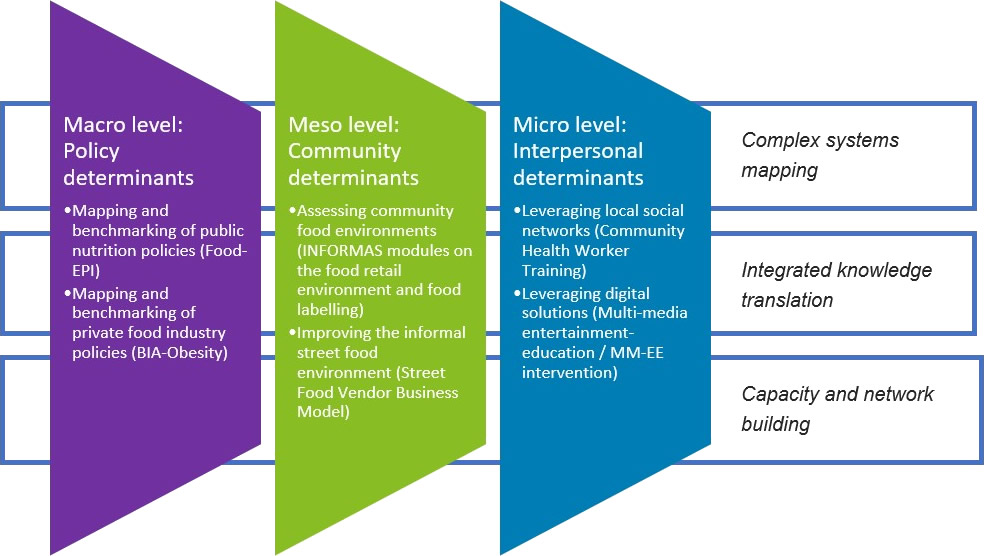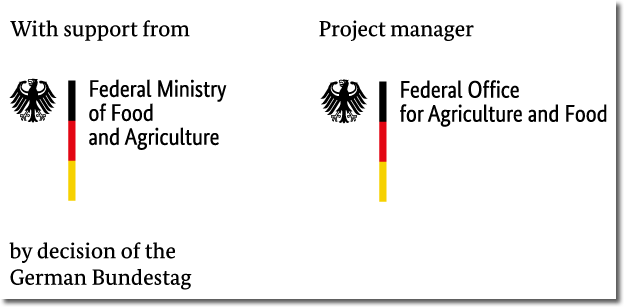Work
Packages
FoodSAMSA consists of three pillars, addressing policy, community and interpersonal determinants of dietary behavior, and of three cross-cutting components, including complex systems mapping, integrated knowledge translation, and capacity and network building.
Across these pillars and components, the work is divided into eight work packages (WPs).
The first pillar (WP 2 and WP 3) addresses policy determinants of dietary behavior, covering both public and private food industry policies, by adapting and implementing methodological frameworks developed by the International Network for Food and Obesity / Non-communicable Diseases Research, Monitoring and Action Support (INFORMAS) Network. Specifically, these WPs include the update of the Food Environment Policy Index (Food-EPI) for South Africa, which was first implemented in 2016. They will also include the adaptation of the Business Impact Assessment on Obesity and Population-level Nutrition (BIA-Obesity) framework to address under- and overnutrition, and its implementation in South Africa. Food-EPI and BIA-Obesity are methodological frameworks used to assess public and private sector food policies, benchmark them against international best practices and identify priority actions for change, while working closely with policy and business stakeholders to ensure practical relevance, project ownership and uptake of recommendations.
The second pillar (WP 4 and WP 5) addresses determinants of dietary behavior at the community or setting level. Specifically, we will assess key aspects and determinants of the community-level food environment, including outdoor food and beverage advertisement and foods and beverages offered by informal food businesses. In doing so, we will build on previous work by the South African Consortium members on food advertising in TV and print media, and on the street food environment. Moreover, we will expand, revise and update the Street Food Vending Model (SFVM), an existing capacity building scheme developed by the SAMRC for informal food businesses in Cape Town, to support health-promoting changes to the street food environment and the livelihoods of informal food economy actors.
The third pillar (WP 6) addresses interpersonal determinants of dietary behavior. Here, the research team will liaise with community health workers to refine, expand and evaluate a Multi-Media Education-Entertainment (MM-EE) intervention. The MM-EE intervention has been developed by the South African partners in partnership with community health workers. It consists of culturally adapted health education messages integrated with comic books and videos and disseminated via popular entertainment media, including WhatsApp, aimed at improving the food literacy and dietary behaviors of township residents. We will pilot, refine and expand the MM-EE intervention, and implement this in three selected townships in the Western Cape, while conducting a mixed-methods evaluation of its impact.
Moreover, three cross-cutting project components inform activities within the three pillars:
The first cross-cutting project component (WP 1) uses complex systems mapping to conceptualize selected parts of the South African food system, to identify levers for change as well as system components warranting further analysis and monitoring. Building on the team’s extensive experience with logic modeling and systems analysis, complex systems maps will be developed, depicting drivers of the syndemic of malnutrition from diverse perspectives and identifying points of leverage for action.
The second cross-cutting project component (WP 7) focuses on capacity and network building in Sub-Saharan Africa. Existing networks will be leveraged, such as the networks developed by the Chronic Disease Initiative for Africa (CDIA), the Collaboration for Evidence-based Healthcare and Public Health in Africa (CEBHA+), as well as the Africa Food Environment Research Network (FERN) Initiative. We will deliver capacity-building workshops, provide methodological support for researchers, and facilitate mutual learning, including networking and collaboration through digital platforms and networking events.
The third cross-cutting project component (WP 8) applies integrated knowledge translation approaches to maximize the local and regional relevance of the FoodSAMSA research for policy and practice stakeholders. Relevant stakeholders, including formal and informal businesses, civil society actors, policymakers as well as consumers and citizens are involved at various stages of the research process. This WP will be realized using a variety of formats (e.g., policy briefs) and modes of interaction (e.g., stakeholder consultations).


